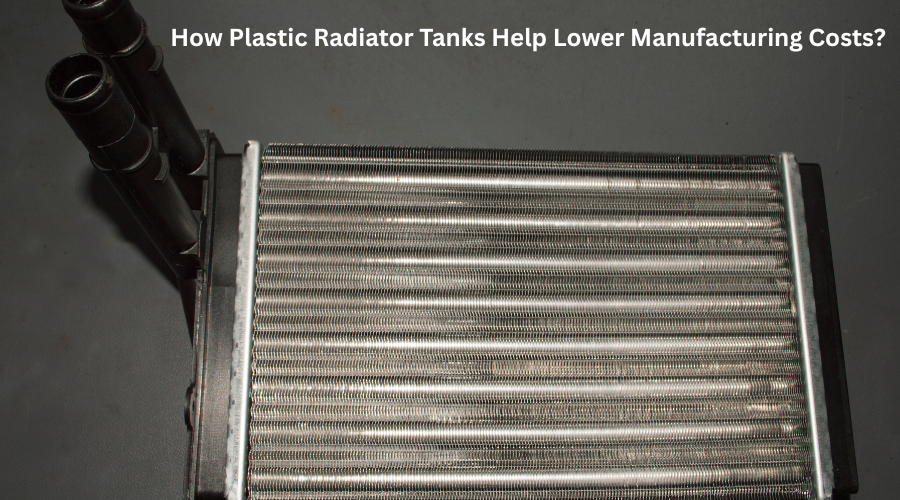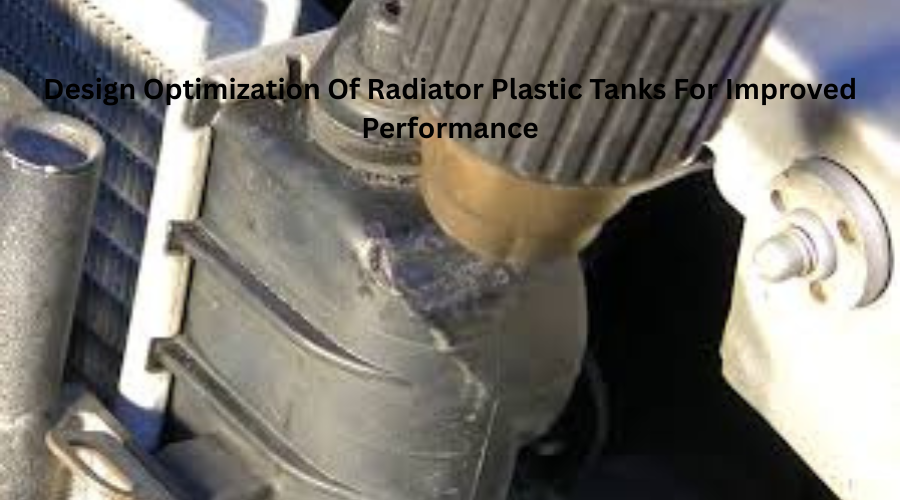What Are The Long-Term Effects Of Replacing The Plastic Radiator Upper And Lower Tanks With Brass To Prevent Leaks?
- linghangtechnology
- Dec 24, 2024
- 6 min read

When it comes to car maintenance, the radiator is one of the most important components, ensuring that your engine stays cool during operation. However, over time, the plastic radiator tanks (upper and lower) can weaken, crack, or leak due to the constant pressure, heat, and exposure to fluids. As a result, car owners may look for solutions to prevent these leaks, with one potential fix being the replacement of plastic tanks with more durable materials like brass. But is this a good idea? We will discuss in this blog, the long-term effects of replacing your plastic radiator upper and lower tanks with brass and whether this modification is beneficial in the long run.
Why Do Radiator Tanks Leak?
Radiator tanks, both upper and lower, are often made from plastic due to their lightweight and cost-effective nature. However, plastic has its downsides. Constant exposure to high temperatures, pressure from the coolant system, and wear and tear can lead to the plastic becoming brittle over time. When the plastic cracks, leaks occur, resulting in reduced cooling efficiency and potential engine damage if not addressed promptly.
Plastic radiator tanks are also vulnerable to:
UV damage: The sun's rays can weaken plastic over time, making it more prone to cracking and degradation.
Thermal cycling: Continuous thermal fluctuations can cause plastic tanks to expand and contract, leading to stress fractures and leaks.
Chemical exposure: Coolants and other chemicals can gradually break down the structure of plastic, especially if not regularly replaced or maintained.
This is why some car owners are considering alternatives like brass to replace their plastic tanks, hoping for a more durable and long-lasting solution.
Why Brass?
Brass is a metal alloy made primarily from copper and zinc. It's known for its strength, durability, and resistance to corrosion. Brass is often used in various automotive parts due to these qualities, including radiator components. But is replacing plastic with brass a wise decision? Let's dive deeper into the potential long-term effects of such a modification.
Long-Term Effects of Replacing Plastic Radiator Tanks with Brass
1. Durability and Strength
Brass is undeniably stronger and more durable than plastic, making it an appealing choice for radiator tanks. Plastic, while cost-effective and lightweight, can break down over time. Brass, on the other hand, is resistant to cracking and can withstand high temperatures and pressures for much longer. The long-term benefit is that brass tanks are less likely to crack, leak, or fail under normal conditions.
Prolonged lifespan: Brass radiator tanks can last much longer than plastic tanks, potentially saving you from frequent repairs and replacements.
Better resistance to damage: Brass is not as inclined to the damage caused by UV rays or thermal cycling, making it a more reliable material over time.
2. Improved Corrosion Resistance
One of the key advantages of brass over plastic is its corrosion resistance. While plastic can degrade and crack, brass offers better protection against the corrosion caused by the coolant and the exposure to water and air over time. This is especially important if your vehicle is regularly exposed to moisture, salt, or other corrosive elements.
Long-term protection: Brass is much less likely to develop rust or corrosion than steel or other metals, which can be crucial in maintaining the integrity of the radiator system.
Reduced maintenance: A brass radiator tank will require fewer repairs related to corrosion, helping keep your engine cooling system in good working condition.
3. Potential for Overheating
While brass is stronger and more durable, there is a potential downside. Brass has a higher thermal conductivity than plastic, meaning it can transfer heat more efficiently. This may seem like a benefit at first, but it can also lead to overheating issues if the radiator design is not adjusted to handle the change in heat transfer. The increased heat transfer could result in:
Increased stress on the coolant system: If the radiator cannot handle the extra heat, it could cause other components to wear out faster.
Increased pressure on hoses: Brass tanks may lead to increased pressure within the radiator system, causing hoses and seals to wear out faster.
4. Weight Concerns
Brass is significantly heavier than plastic, which could potentially add extra weight to your vehicle. While this may not seem like much, the added weight can impact fuel efficiency, especially in smaller vehicles where every ounce counts. Additionally, the extra weight can affect the handling of the vehicle and may place additional strain on other components.
Reduced fuel efficiency: The added weight from the brass tanks could slightly lower your vehicle's fuel efficiency over time.
Increased load on the suspension: The extra weight could also affect the car's suspension system, leading to quicker wear.
5. Cost Considerations
Brass is a more expensive material than plastic, so replacing your plastic radiator tanks with brass will likely come with an increased initial expense. While brass is a more durable material, it is important to weigh the costs against the benefits. In some cases, the extra expense may not be justified if you do not plan to keep the vehicle long-term or if you don't experience frequent issues with your plastic tanks.
Higher initial cost: Brass radiator tanks will likely cost more to manufacture and replace than their plastic counterparts.
Potential long-term savings: While the initial investment is higher, the extended lifespan of brass tanks could result in fewer replacements and repairs down the line.
6. Compatibility Issues
Replacing plastic with brass may also lead to potential compatibility issues. The radiator system in your vehicle is designed with plastic tanks in mind, and switching to brass may require modifications to other components, such as fittings, hoses, and brackets. The tight seal that plastic tanks create may not be easily replicated with brass, potentially leading to leakage if not properly installed.
Installation complexities: A modification of this nature might demand a skilled setup, adding to the overall cost.
Potential system incompatibility: Other components of the cooling system may need to be replaced or adapted to work properly with brass tanks.
It is advisable to consult a radiator plastic tank manufacturer when making the switch, as they may provide guidance on the compatibility and overall benefits of this modification.
Is It Worth Replacing Plastic Radiator Tanks with Brass?
The decision to replace your vehicle's plastic radiator tanks with brass is ultimately a matter of personal preference and circumstances. For car owners seeking a long-lasting solution to radiator leaks and those who are willing to invest in a durable material like brass, this modification may make sense. Brass tanks offer increased strength, better corrosion resistance, and an extended lifespan, all of which can contribute to the longevity of the radiator system.
However, it is important to consider the potential downsides: the added weight, cost, and possible compatibility issues. Additionally, the change in thermal conductivity could lead to overheating concerns if the system is not designed to handle it.
Conclusion
In conclusion, replacing plastic radiator tanks with brass can offer significant long-term benefits, including increased durability, corrosion resistance, and a reduced risk of leaks. However, it is important to weigh these benefits against the potential challenges, such as increased weight, cost, and the need for system modifications. Car owners should carefully consider their options and seek advice from professionals before making such a change to ensure that it aligns with their vehicle's needs.
FAQs
1. Can brass radiator tanks improve my vehicle's cooling efficiency?
Brass has a higher thermal conductivity than plastic, meaning it can transfer heat more efficiently. While this can be beneficial, it may also lead to potential overheating issues if the system is not designed to handle it.
2. Will replace plastic with brass increase the overall weight of my vehicle?
Yes, brass is heavier than plastic, which could slightly reduce your vehicle's fuel efficiency and increase strain on other components like the suspension.
3. Are brass radiator tanks more expensive than plastic?
Yes, brass tanks are generally more expensive than plastic ones, both in terms of material and installation costs. However, the longer lifespan of brass may save you money in the long run.
4. Can brass radiator tanks be a good option for older vehicles?
If your vehicle is older and you want a more durable solution to radiator leaks, brass may be a good option, but it's important to consider potential compatibility issues and the cost of modification.
5. How can I ensure my brass radiator tanks are installed correctly?
Discuss with a professional mechanic or technician to ensure the brass tanks are properly fitted and compatible with your vehicle's cooling system.






Comments